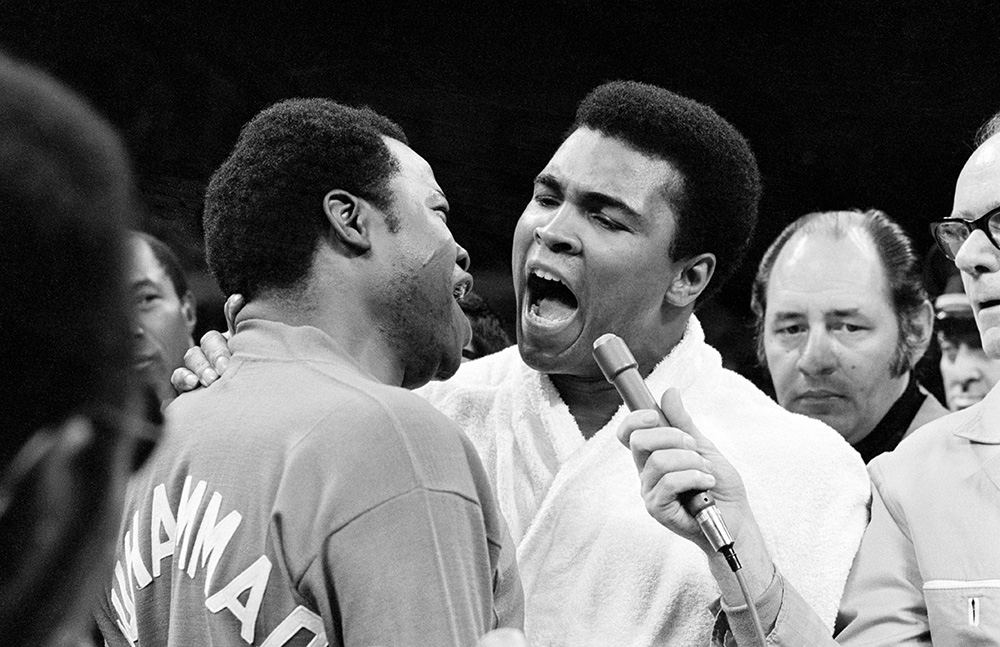Muhammad Ali manages to dodge a punch from Joe Frazier in a heavyweight championship battle at Madison Square Garden in 1971. Frazier emerged victorious with a unanimous decision after 15 rounds, seizing the undisputed heavyweight title.
Fifty-two years ago today (March 8), Joe Frazier and Muhammad Ali, two unbeaten heavyweights vying for the world title, squared off to determine boxing’s ultimate superstar. The showdown aimed to decide the rightful ruler of the division, transcending being merely a battle for the “biggest prize in sports.” The “Fight of the Century” evolved into a cultural phenomenon that enchanted the global audience, captured the imagination, and Larry Merchant was present to witness the 15-round epic in all its grandeur and spectacle.
The article was first featured in The Ring’s April 2021 issue. To commemorate the anniversary of the iconic clash, the digital version of the special issue has been made available free of charge on The Ring app.
The world seen from center of Fraser Ali’s Storm
BBefore 1971, there were 1910 and 1938. These were the years when the heavyweight boxing scene reverberated with intensity, transforming into a symbolic representation of political and cultural tension. The era culminated with the clash between the undefeated champions, Ali and Frazier. The bout conjured images of Eskimos in their igloos, indigenous Polynesians, and even extraterrestrial beings on Mars.
In 1910, Jack Johnson, the first African-American heavyweight champion, faced off against Jim Jeffries. Jeffries, the long-retired former champion, was beckoned back into the ring by distressed fans yearning to restore the status quo – a white champion. Though the fight took place in Reno, its impact reverberated far beyond. Johnson taunted “The Great White Hope” for 14 rounds before halting him in the 15th. A backlash ensued, with race-fueled riots across America leading to the deaths of around 20 African Americans. To add insult to injury, the authorities indicted Johnson on the Mann Act, accusing him of engaging in illegal activities by transporting white women across state lines. A cunning strategist, Johnson promptly relocated to Paris, spending most of the next decade there until his retirement.

(Photo by John Shearer/The LIFE Picture Collection, Getty Images)
Fast forward to 1938, a more personal recollection. As a seven-year-old, my father allowed me to stay up late for the Schmeling-Louis showdown broadcast, a legendary event that unfolded near Yankee Stadium, my cherished spot. The atmosphere brimmed with cosmic significance, overshadowing past monumental bouts like Johnson vs. Jeffries and anticipating future classics such as Ali vs. Frazier. Joe Louis emerged as the victor, crushing Schmeling in a single round and toppling Hitler’s propaganda machinery. Louis became a beacon of hope, our nation’s first black hero, succeeding Jack Johnson and confronting racial prejudices head-on. As Hitler’s thundering tirades pierced the airwaves, we sensed the weight of history in the making, transcending mere sports spectacle.
In the tumultuous backdrop of 1971, amidst a nation reeling from upheavals, emerged the long-awaited showdown between Ali and Frazier, two titans embodying contrasting styles inside and outside the ring. The turbulent ’60s marked by tragic assassinations and socio-political movements set the stage for this monumental clash. Ali’s defiant stand against the Vietnam War and subsequent return after a forced hiatus, juxtaposed against the backdrop of civil rights struggles, anti-war protests, and cultural revolutions, underscored the fight’s significance beyond mere sport. Divisions ran deep as ideological lines were drawn, with liberals rallying behind Ali and conservatives siding with Frazier as if their lives and legacies hung in the balance.

Frazier and trainer/manager Yank Durham check the scales on fight day.
Personally acquainted with both Ali and Frazier, I held a slight admiration for Ali owing to his rebellious streak and unparalleled flair for showmanship. An encounter at Ali’s Miami residence left me amused by his charismatic persona. Joe Frazier, on the other hand, I met in Philadelphia – a man who transitioned from a farm in South Carolina to pursue boxing, working in a slaughterhouse to support his family after clinching a gold medal at the 1964 Tokyo Olympics. A community effort facilitated his evolution into a full-time professional boxer, a journey intertwined with my own fleeting investment in his career.
I believed Frazier captured the dramatic essence of the fight, despite being one of the few who scored it in favor of Ali.
This monumental battle, etched in history, commenced its narrative as I engaged with legendary footballer Jim Brown, a friend and supporter of Ali. Brown, inquisitive about my leaning towards Frazier due to doubts about Ali’s recovery from his enforced absence, set the stage for a poignant prelude to the impending showdown. My column, guided by the heart, sided with Ali despite acknowledging Frazier’s potential prowess on any given day.

Ali and his talkative compatriot Drew “Bandini” Brown make a fuss at the weigh-in.
Reflecting on the night of the showdown, a congregation of influential figures, politicians, celebrities, and mobsters clad in dark suits filled the arena. Frank Sinatra and other luminaries documented the momentous occasion for Life magazine. The resounding roars reverberated through Madison Square Garden’s history as the spectacle unfolded, capturing the essence of a battle that transcended mere sport. As Ali weathered the storm, enduring Frazier’s relentless assault, the fight unfolded with fierce exchanges and dramatic shifts, culminating in 15 gripping rounds punctuated by Ali’s resilience and Frazier’s unyielding spirit.
While Frazier may have prevailed in the dramatic showdown, exhibiting unrivaled tenacity against a formidable opponent, my unconventional scorecard favored Ali, a perspective at odds with the prevailing sentiments.

A knockdown that shocked the world.
Initially aligned with the emotional tide, I accepted the outcome but gradually found myself questioning my judgment once more.
The following day, the front page of the widely read Daily News featured contrasting images – a victorious but battered Frazier labeled as the “Winner” and an unscathed but defeated Ali titled the “Loser.”
Subsequent reports revealed Frazier’s arduous recovery from the bruising encounter, spending over a week recuperating in a Philadelphia hospital.
Years later, my colleague dissected Frazier’s initial victory before Ali turned the tide in the rematch, culminating in a historic trilogy highlighted by Ali’s triumph in the third bout via TKO, considered the heavyweight division’s most fiercely contested duel. Amidst the intensifying drama, a collective recollection ensued, analyzing the bout’s intricacies and unraveling its cinematic narrative.
The statistical breakdown, predating modern analytics, revealed Ali’s dominance in clean punches landed against Frazier, underscoring the intricacies of their memorable bout.
In essence, the monumental clash between Ali and Frazier transcended expectations, etching a timeless narrative in boxing history, and propelling both fighters into the annals of sporting legends.
As the curtains closed on the epic showdown, conservatives found solace in retaining the status quo, yet harbored regrets over the trilogy’s outcomes. In retrospect, the lingering echoes of that historic encounter continue to resonate through the annals of boxing lore.

Read: 10 Best Left Hookers by Lee Groves






